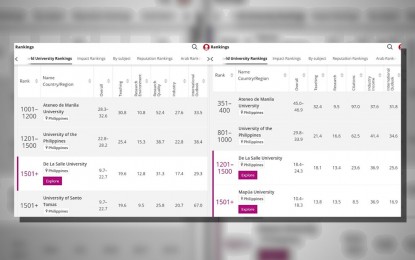CHED to assess PH universities’ decline in global ranking


TIMES HIGHER EDUCATION RANKING. Ateneo de Manila University (ADMU) continues to lead the Philippines higher education institutions (HEIs) in the 2024 Times Higher Education (THE) global ranking. However, its ranking slid from last year’s level, along with those of the University of the Philippines and the De La Salle University. (Photo grabbed from the THE website)
MANILA — The Commission on Higher Education (CHED) will look into the factors behind the decline of some Philippine higher education institutions (HEIs) in the 2024 Times Higher Education (THE) World University Rankings.
This came after Ateneo de Manila University (ADMU), University of the Philippines (UP), De La Salle University (DLSU), and several others slid compared to their levels in 2023 ranking.
In a Viber message to journalists, CHED Chairperson J. Prospero de Vera III said both the number and performance of HEIs abroad may be considered factors.
“There are additional HEIs that joined the rankings. So, if the scores of the new or additional HEIs are high, they will be ranked higher than Philippine HEIs and the rank of Philippine HEIs will go down,” he said Thursday (Sept. 28, 2023).
De Vera also mentioned about the possibility of previously-ranked international HEIs with “faster score improvement” than participating universities from the Philippines.
“Because these HEIs are increasing investments in research, faculty development, facilities, etc. compared to Philippine HEIs, they end up ranking higher than Philippine HEIs,” he said.
De Vera, however, explained that a lower ranking doesn’t automatically represent a lower score.
“So, what we should look at are the scores of Philippine HEIs this year compared to last year. If the total scores have increased but their rank is lower then any of the two reasons above can apply,” he said.
Amid these, De Vera assured universities of the Commission’s commitment to help in determining areas to work on.
“We should also look at criteria/areas where they are not going up fast (or worse may have gone down) like research and compare that with higher ranked universities. Then we know what we have to improve on,” he said.
THE assesses HEIs based on teaching, research environment, research quality, industry, and international outlook.
For the 2024 THE World University Rankings, ADMU remains the highest-ranked HEI in the Philippines after it was included in the 1001-1200 place, down from 351-400th last year.
It garnered an overall score of 28.3 to 32.6, lower than last year’s 45 to 46.9, but with a slight improvement in the research environment and international outlook.
The state-funded University of the Philippines (UP) slid to the 1,201-1500 this year from last year’s 801-100th place.
Its over-all score slipped to 22.8 to 28.2 score compared from last year’s 29.8 to 33.9, although an increase in teaching and international outlook scores were recorded.
De La Salle University (DLSU) ranked third among Philippines-based HEIs after being included in the 1,501+, from the previous year’s 1,200 to 1,500. It got an overall score of 9.7 to 22.7, lower than 2023’s 18.4 to 24.3 overall score but registered improvements on research quality and international outlook.
Meanwhile, the University of Santo Tomas (UST), which was previously categorized among “reporter” universities, is now included in the 1501+ ranking. It, however, posted lower performance assessments on research quality and research environment.
Moreover, Mapua University, which was previously ranked in the 1501+, joined other PH HEIs in the reporter category.
Other domestic HEIs that are in the ‘reporter’ category include Cebu Technological University, Central Luzon State University, University of Eastern Philippines, Mariano Marcos State University, Mindanao State University – Iligan Institute of Technology, Nueva Ecija University of Science and Technology, University of Science and Technology of Southern Philippines, Tarlac Agricultural University, and Visayas State University.
According to the THE website, universities with ‘reporter’ status submitted data for assessment but failed to meet the eligibility criteria for the global ranking.
Overall, the University of Oxford ranked first in this year’s THE global ranking, with an overall score of 98.5, followed by Standford University, 98; Massachusetts Institute of Technology, 97.9; Harvard University, 97.8; and the University of Cambridge, 97.5.
CHED, earlier, underscored the need for more PH HEIs to join institutes assessing global rankings to advance the country’s higher education internationalization agenda.
Through global rankings, universities will be recognized for their performance or identify key areas to improve on based on comparison to universities abroad. (PNA)






